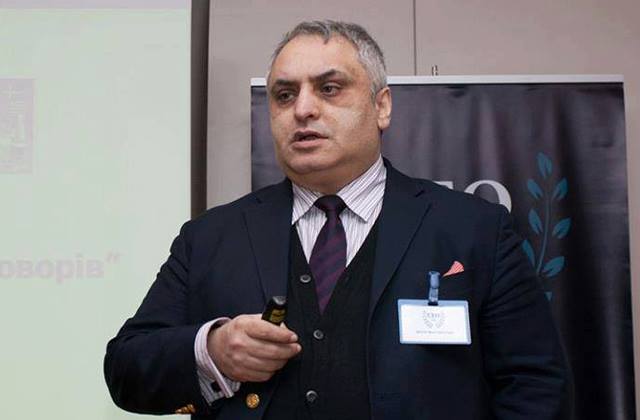This is not a Trade in Aghdam Bazaar to Touch upon Concessions through Threatening with the Weapon: Artur Martirosyan

Interview with Artur Martirosyan of Boston, Senior Consultant, CMPartners, a negotiation specialist.
Mr. Martirosyan, NK president Bako Sahakyan stated, “Mutual concessions are necessary. Moreover, these mutual concessions should be reasonable and equivalent. Regarding the limit of mutual concessions, in no way should they weaken the security system and act as a tempting circumstance for aggression for the other side.” What does this mean and which “concessions” won’t disrupt NKR security?
Naturally, I can’t clarify instead of NKR president. However, if you pose this question to the negotiation expert with 24 years of experience in high-level negotiations from Latin America, Middle East and parties to the conflict in the post-Soviet space, then I perceive his words in the following way: NKR authorities are ready for constructive negotiations, which suppose seeking for mutually acceptable and beneficial solutions for both sides. It’s a rather serious process, although its sense is very simply explained.
To reach such a negotiation level, besides lasting period it’s also necessary that the sides clearly realized what they may get more and better around the negotiation table, rather than continue adhering to the alternative for the negotiations. In our case those alternatives in a simplified form are observed the following way: in case of the Armenian side it’s the status quo with continuous steps of independence development, and in case of the Azerbaijani side—war threats, attempts of Armenia’s isolation, the postponing war, consuming resources of the Armenian side coupled with unleashed hatred propaganda towards everything, that is Armenian.
However, refusal of the Azerbaijani side from those alternatives, as well as establishing direct, productive communication between means of trust and the sides, is necessary, but not a sufficient condition to pass on to constructive negotiations, when as RF president Vladimir Putin stated, “There are no winners or losers, but there are solutions, acceptable for the societies of both sides.” The sides are too far from such negotiations. As Bako Sahakyan stated to the point, security can’t be a subject for trade. Unilateral concessions are totally nonsense; it may occur only in case, when any or both sides are exerted solutions. Such an approach in Karabakh conflict is excluded. It should be clear to both mediators and the international community why it’s impossible to bring the sides to constructive negotiations: the Azerbaijani side claims its deconstructive alternatives, which instigate the sides to seek for a non-peaceful settlement.
How would you comment on recent publications of Russian media outlets, that Russian peacekeeping mission should be deployed on the conflict zone. Moreover, it’s being circulated that RF Defense Minister negotiates with Azerbaijani and Armenian sides on that very issue. Is this possible? What implication will it have and doesn’t deploying of a peacekeeping mission exclude or make senseless implementation of agreements reached in Vienna, in particular, installation of investigative mechanisms and expanding the Office of the Personal Representative of the OSCE Chairman-in-Office?
It’s not the first year that we hear talks on deploying Russian peacekeepers on the conflict zone. I don’t have reliable information on recent negotiations in Baku and Yerevan with the participation of RF Defense Minister Shoygu, and I don’t do coffee predictions. However, I know one thing for sure—Russia can’t fraudulently pass such a decision, even if it has the approval of all sides. In this conflict mediation isn’t unilateral, and all mediators have some interests, which in no way coincide at that point. Mediators have general position, which is reflected in preambles of numerous proposals—there is no alternative to peaceful settlement.
Resumption of any military operation is full of unpredictable implications, which can’t exclude sharp worsening of the positions. Games with such dangerous stake, as the developments in Donbas showed, may first and foremost, complicate Russia’s position as a distant mediator. Currently not peacekeepers are necessary on the border, but mechanisms of ceasefire maintenance. Peacekeeping activities with Russia’s unilateral participation don’t have definite success stories.
It’s enough to recall that on Georgia-South Ossetia conflict zone existence of Russian peacekeepers in no way prevented 08.08.08 five-day war. I’m not speaking of the attempt of the Soviet “peacemakers,” which is well remembered in Karabakh. I don’t think that the sides can develop an agreement on peacekeepers during one or a few meetings, if such occur in autumn. And the issue is not only that it’s a rather raw material, that process format and agenda don’t suppose such a turning point, but the sides have a rather simple means—by playing on contrasts between Russian peacekeepers, refusing pure Russian proposals on peacekeepers. At large, the very Russia doesn’t need that bother.
OSCE MG U.S. Co-Chair James Warlick welcomed Russia’s willingness to appear as Karabakh conflict settlement guarantor, at the same time touching upon deploying international peacekeepers in NK. What does this mean?
In some Armenian circles targeted fictitious news is being circulated that there is no agreement regarding the settlement between Russia and Western mediators. There are issues which they totally share. However, this doesn’t mean that there are no discordances. Statement by Ambassador Warlick shows that they have disagreements regarding peacekeepers.
On the whole, in my perception of the process, serious issues on the settlement will be postponed until next autumn. Various premises are available for that, both domestic policy issues (e.g. elections in mediator countries, Armenia and NKR), and dynamics of implementation of existent agreements. It’s impossible to move forward, not implementing it, around which agreements have already been reached. Installation of investigative mechanisms on the contact line will lead to the point that the Armenian side will be obliged to withdraw from any new proposal, until Vienna agreements are fully implemented.
It’s rather logical and there is no any realistic resistance. Leaving issues of April aggression, accompanied with violation of any norms and rules of waging war, without equal assessments, practical and organizational conclusions, would be an unforgiven mistake for the Armenian side.
Politicians of Armenia and Artsakh frequently use words “concessions” or “mutual concessions.” How proper is it to use them under current condition, aren’t they psychologically directed to raising predispositions among the society?
In this case I wouldn’t advise using “concessions.” In constructive negotiations “concessions” aren’t recorded, but within possible agreement, equal exchange of primary interests is being recorded. In our country negotiations aren’t led through that model and it’s not clear whether they will at any time. In negotiation theory and practice mutual concessions are recorded only during trade and zero-sum games, when any of the sides urges those concessions to the other side.
Armenia’s soldiers proved with the price of their lives both during the first and second wars, that it’s senseless urging concessions and it can’t be recorded in people’s secure and independent development. It’s not a trade in Aghdam’s bazaar to touch upon concessions through threatening with the weapon, which yet has illusions on the possibility of settlement through force. For that very reason I’d advise Armenia’s politicians and mass media avoid using “concessions” or “mutual concessions.”
By Gayane Khachatryan

























